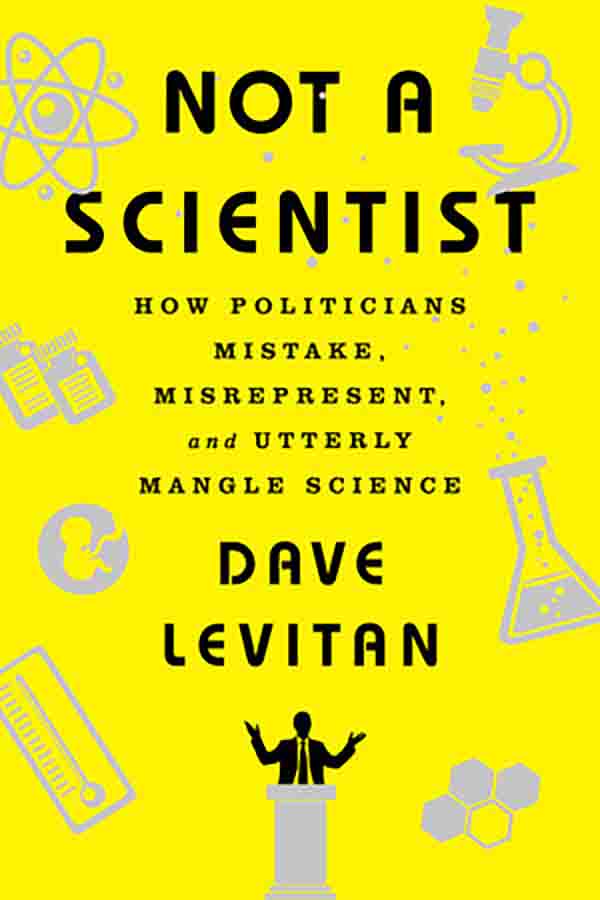Abogus claim about abortion and pregnancy — that science has confirmed that fetuses can feel pain as early as 20 weeks after conception — made the rounds again in Congress this month. Rep. Trent Franks, an Arizona Republican, tweeted this oft-repeated myth before reintroducing a measure that would criminalize most abortions after 20 weeks; the House swiftly passed it, 237-189.

“Basic science will often sound ridiculous because it’s basic. It’s working on model organisms like flies and mice.”
Visual: courtesy of Dave Levitan
Similar bills were passed in 2013 and 2015, but never made it through the Senate, and this one too is unlikely to become law. But the misrepresentation of science by politicians is a problem that isn’t about to go away. The myth-busting journalist Dave Levitan opens the first chapter of his recent book “Not a Scientist: How Politicians Mistake, Misrepresent, and Utterly Mangle Science” (W.W. Norton) with a vignette from the 2015 discussion of the fetal-pain bill. (Full disclosure: Between 2013 and 2015, I assigned and edited a few of Levitan’s freelance stories for Scientific American.)
Working at the time as a reporter debunking false scientific claims in the news for the nonprofit site FactCheck.org, he noticed that when it comes to science, politicians use similar rhetorical flourishes to conceal their underlying confusion and even outright deception. Their stratagems fall into predictable patterns, to which he affixed labels that became his chapter titles: the Oversimplification, the Cherry-Pick, the Literal Nitpick, the Credit Snatch, and so forth.
Slick speech in public dates at least to Cicero, but these days its consequences can affect hundreds of millions or even billions of people. For this installment of the Undark Five, Levitan and I recently discussed politicians’ misrepresentations of science, which can range from inane to life-threatening. Our conversation has been lightly edited for length and clarity.
UNDARK — Of the 13 rhetorical devices you describe, is there one that really stands out for you?
DAVE LEVITAN — I think the one that sort of wounds my soul the most, let’s say, is the “Ridicule and Dismiss.” The concept there is that politicians will describe usually basic scientific research in very ridiculous terms as a way to try and convince people to not fund it anymore.
Basic science will often sound ridiculous because it’s basic. It’s working on model organisms like flies and mice. Or it’s working on very specific parts of a cell, or proteins, or anything really. When you describe it on its own, it will sound useless. It’s only when we spend years on that and then combine it with decades of research on something else that we start to get to usable answers on things. That’s just fundamental to how basic science works. And it’s why we have the NIH spending about $30 billion a year funding things like that.
To try and undercut that seems just so brutal to me. But when politicians want to try and score points for calling out wasteful government spending, they tend to pick on science.

Thirteen ways to conceal confusion, ignorance, and outright deception.
UD — In the Ridicule and Dismiss chapter, you tell the story of Sen. Rand Paul mocking fruit fly research. He says, “They spent a million dollars trying to determine whether male fruit flies like younger female fruit flies. I think we could have polled the audience and saved a million bucks.” Why is that kind of statement significant?
DL — Actually, we have evidence of how bad this is just this month, when the Nobel Prize in Physiology or Medicine went to researchers who did work on fruit flies to figure out circadian rhythms. Not every bit of research is going to result in a Nobel Prize, but [Paul] was trying to establish his bona fides in terms of government waste and spending.
As I mentioned in the book, it goes back a long way that politicians have tried to call out some of this stuff. There were the Golden Fleece Awards with Sen. William Proxmire. And then there was Sen. Tom Coburn’s Wastebook. And people are still doing it today. They put out these publications where they make fun of individual NIH or NSF grants, where you’re really undercutting the public support for funding for science, which can be damaging. I mean, we live as long as we do because of publicly supported scientific research that will sound ridiculous if you describe it quickly. So it really can have far-reaching effects.
The good bit of news there is it really does seem that there is bipartisan support for funding for this stuff. I mean, even this year the Trump administration wanted to cut I think it was $6 billion out of NIH’s $32 billion. But the budget out of Congress actually added money. So they ignored that request.
UD — There’s a partisan element to many of these misrepresentations of science. Do you have any sense of how this trend might evolve in coming years?
DL — I see some progress in the sense that there is now a bipartisan coalition in Congress about doing something about climate change. And there is increasing public support when you look at polling about understanding of climate and support for doing something about it. And obviously that’s just one topic, but it’s kind of the biggest one these days.
There are certain issues that seem to cross party lines in different ways. GMOs is one of them that certainly Democrats do their fair share of getting wrong. And if you look at who are the anti-vaccine people in this country, a lot of them tend to be sort of liberal enclaves around the country.
So it’s not all just partisan; there are Democrats in the book. But clearly there are more examples in the last decade or two of Republicans getting science wrong. I can’t say I see that shifting dramatically.
UD — You wrote the book before President Trump’s election. What are your thoughts about his statements about science?
DL — Actually the important point that I’ve noticed is that since taking office, he basically doesn’t talk about science. He gave one speech, about pulling out of the Paris climate agreement, which was riddled with errors. And that’s kind of it.
So what I’ve been looking at more is the people he has hired to run his agencies, because they have to talk about science. Both Scott Pruitt [chief of the Environmental Protection Agency] and Rick Perry [the U.S. Secretary of Energy] have said something along the lines of “CO2 is not the knob that turns the climate.” And I find that to be the most hilariously egregious version of the Blind Eye to Follow-Up ever, because they are ignoring more than 100 years of science.
Pruitt’s idea for this red-team, blue-team debate about climate science is sort of a similar example. I mean, he’s pretending that we haven’t already done this, over and over, in peer-reviewed literature, for decades and decades now. He’s just acting like all of that doesn’t exist to advance an agenda.
UD — Your research suggests that President Ronald Reagan might have initiated the “I’m not a scientist” lead-in to statements that mangle science. Have politicians moved on from this device?
DL — What’s interesting is that I thought it was largely gone. I was a little worried about this when the book was coming out, because in his 2015 State of the Union address, President Obama sort of killed the line by saying, “Well, I know some good scientists,” basically making the argument “O.K., fine, you’re not a scientist but you can listen to them.” And that really did seem to kill it for a little while.
I was a little worried — well, if no one is using this line, is this even that good a title for a book? But it turns out that reports of its death were a little premature. In the last year I have started to see it come back and I am amazed, because it really is such a dumb talking point. My guess is that won’t last forever, because I think it has gotten harder to use with a straight face. But it is certainly not dead just yet.
Robin Lloyd is the former news editor for Scientific American, and she writes frequently for Undark’s Cross Sections blog.










